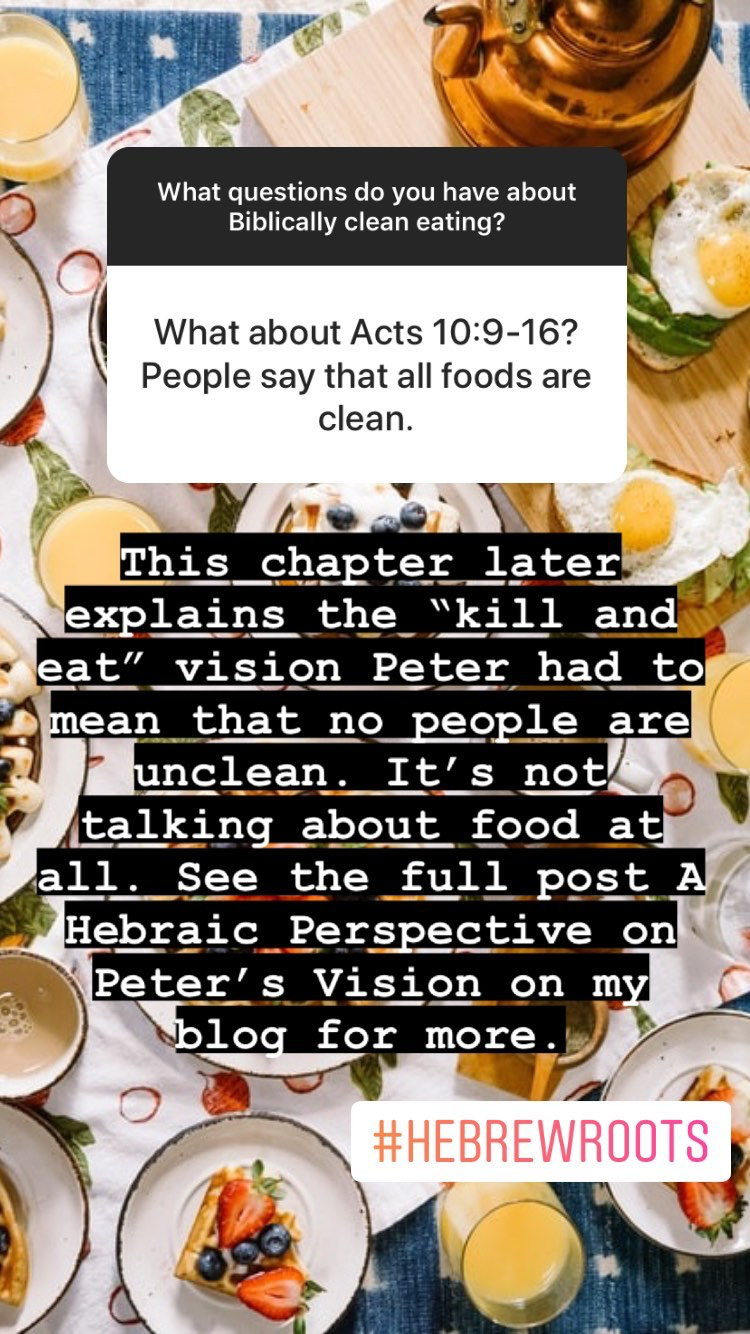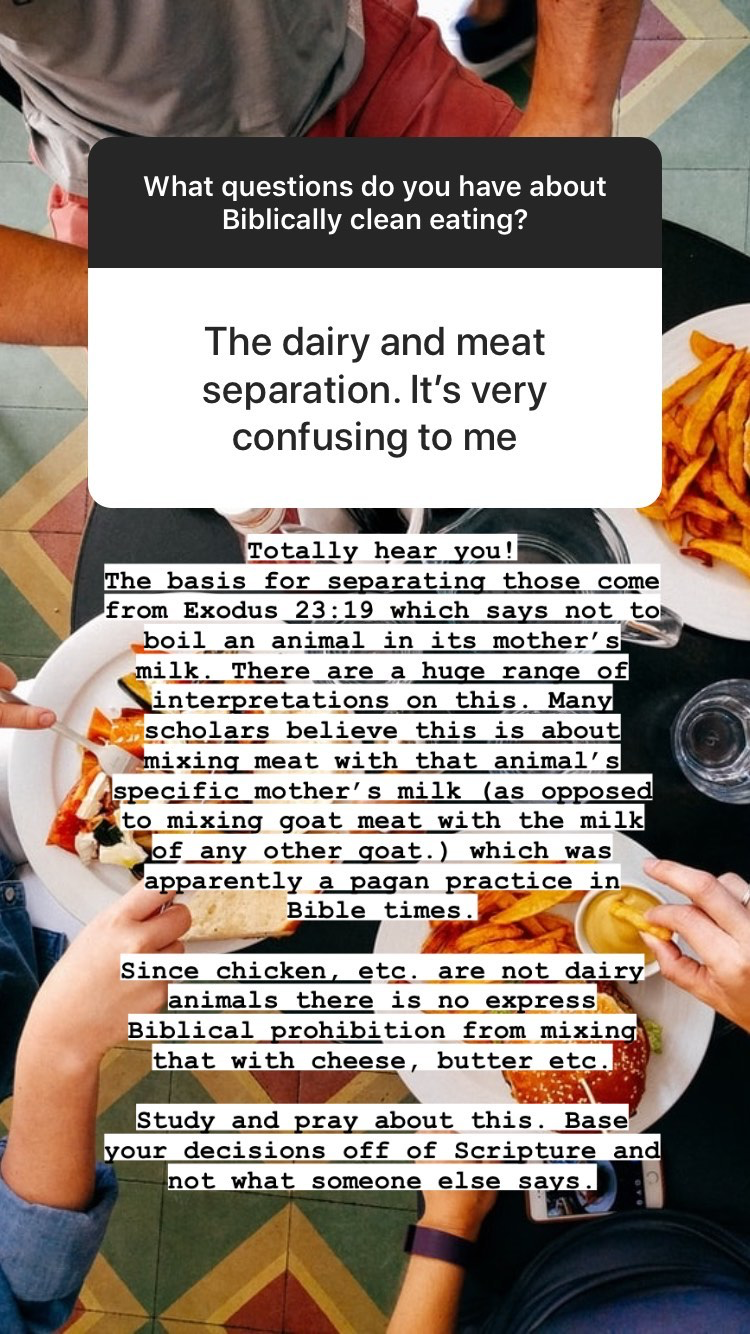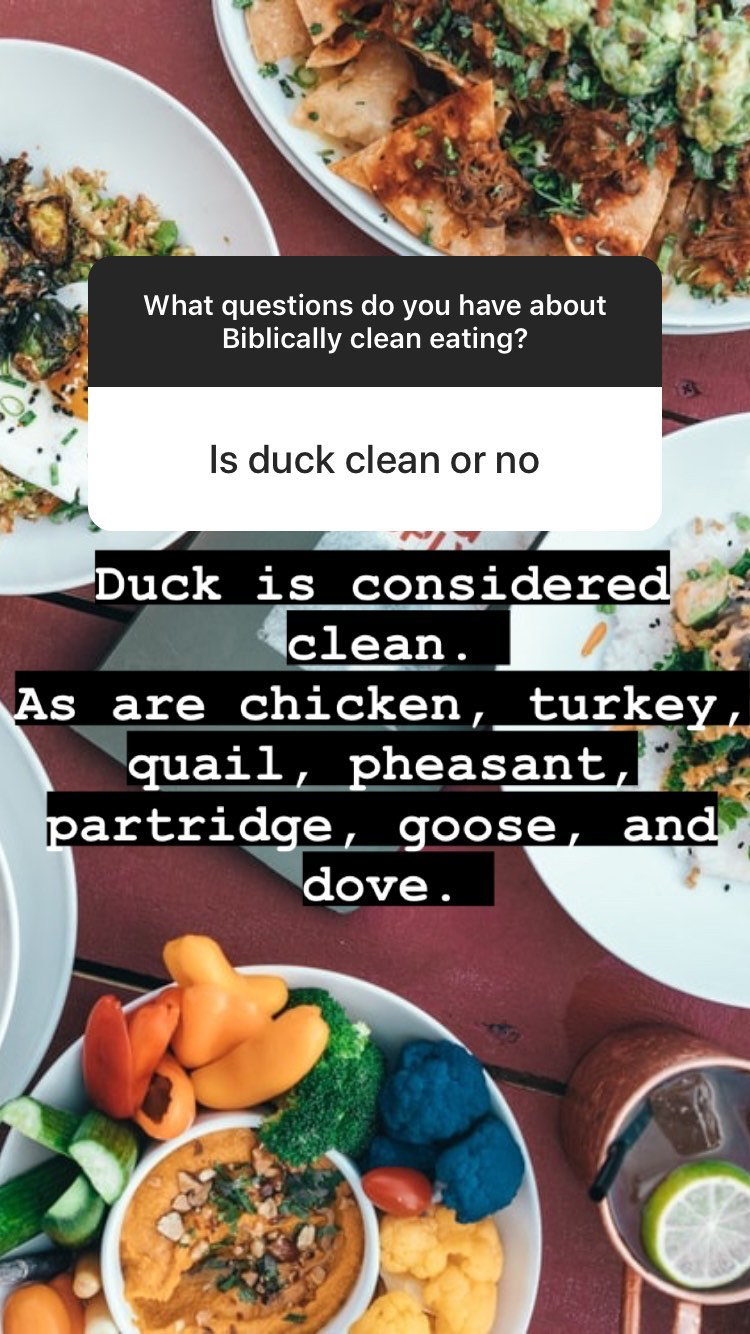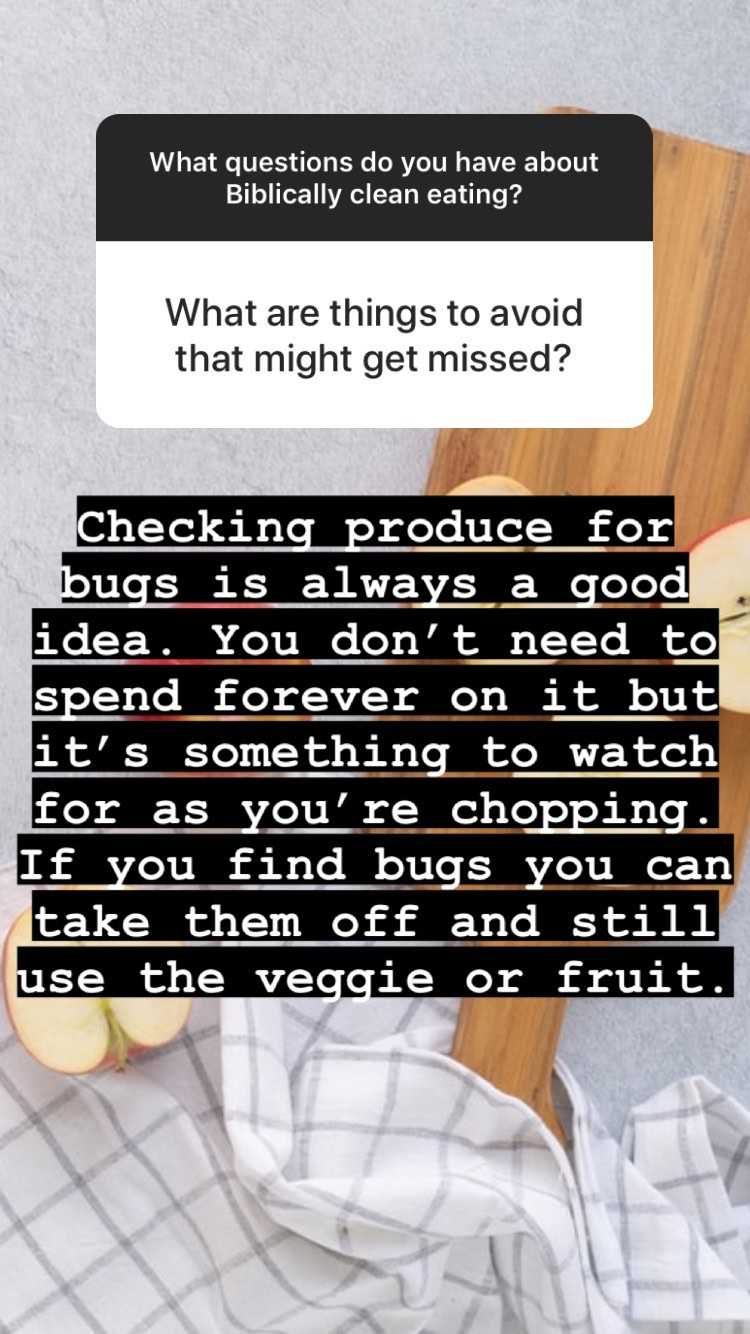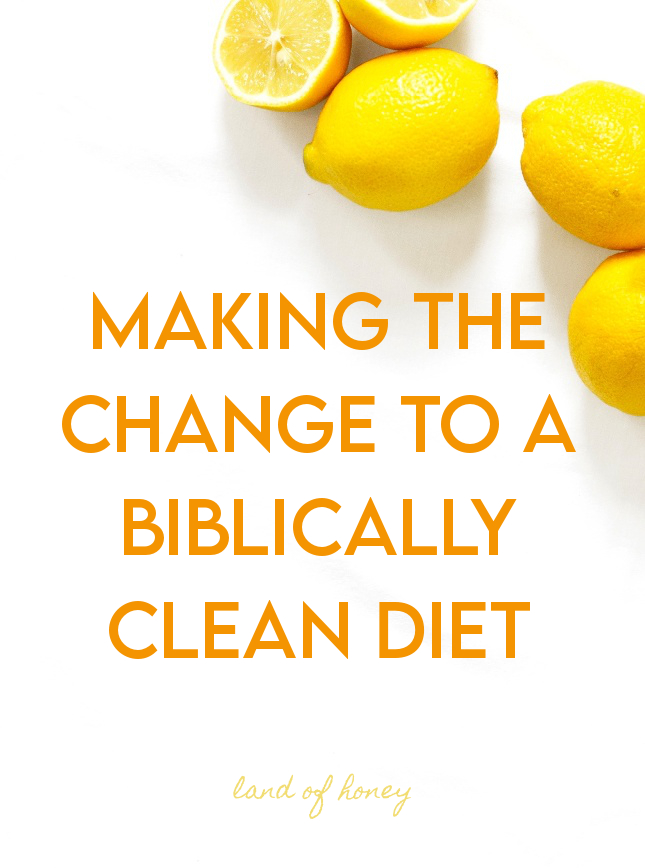You've decided you want to start eating the way that Scripture instructs, now where do you begin? Today I want to talk you through the practical side of how you can eat a diet that is Biblically clean.
What is Biblically clean eating?
If you're not familiar with what Biblically clean eating is then see this post. It's not complicated, it's just making sure we don't consume animals that the Bible calls unclean, such as pigs, shellfish, and fish that don't have fins or scales. On a Biblically clean diet you are free to consume clean meats such as beef, lamb, chicken, and fish with fins and scales, as well as all vegetables, fruits, grains, beans, herbs, nuts, eggs, and dairy products.
Once you are familiar with what foods are considered Biblically clean (really Scripture only calls clean things food - it never refers to pigs, etc. as "food"), it's time to clear the unclean things out of your kitchen, and make a game plan for avoiding them in the future.
Clean out your kitchen.
Go through your refrigerator, pantry, and freezer and look for any products containing unclean animals. This means everything from pork chops and catfish to pepperoni on a frozen pizza or a jar of oyster sauce to a can of pork and beans. Then get rid of these items! Set yourself up for success by getting these things out of your kitchen, and only stocking foods that are Biblically clean.
If you share a kitchen:
If your spouse or roommates or parents are not onboard with Biblically clean eating, then you might not have full control of the kitchen and pantry. In that case, do what you can. Clean out what is yours. Maybe you could designate cupboards or shelves in the fridge that are just for your foods or theirs. You are not obligated to cook or eat meals with unclean things. I know a couple that makes two different sauces each time they have spaghetti. One with pork sausage and one without. If your spouse, parent, or roommate wants to eat something unclean that is their choice, and they can make and purchase those things, but you don't have to be involved in that. You can prepare clean meals, or stick to the clean parts of the meal if someone else cooks.
That said, if it's your kitchen and others in the household aren't on board I don't think you should have to compromise. If you are the homeowner or parent or otherwise in charge, then it's up to you to set the rules for your house. You don't have to let ham or other things forbidden by Scripture live in your fridge or home. Clearly and kindly explain the ground rules for the household.
Make a plan for moving forward.
How are these changes going to affect you? Depending on what your diet was like before, you may have a lot of adjusting to do. You'll want to find alternatives for products you'll no longer be using and things you especially enjoyed. Did you cook with lard before? You'll want to stock up on olive oil or butter so you can use that instead. Can you start using chicken sausage instead of pork sausage? Do you need to break an addiction to bacon? Consider if going cold-turkey would be best for you, or if trying Biblically clean alternatives would be a better fit.
While trying substitutes and new things can be fun, I would also make it a point to turn to recipes and snacks that you already enjoy that are Biblically clean. If it helps, make a list of favorites to turn to when cravings kick in or you're not sure what to do for dinner.
Consider how you will handle meals with others.
It's one thing when you're the one making dinner or ordering takeout. It can be quite another when you're invited to someone else's for a meal. How can you follow Scripture's instructions for eating when you're not in charge of the menu?
You'll want to politely let your host know of your dietary changes. A sentence like, "I'd love to come, but I have to let you know that my diet has changed and there are certain things I don't eat anymore." Or, "I've always loved your barbecue, but my diet has changed. Is there anyway we could do chicken or beef instead? I'd be happy to buy the meat." Offering to chip in and bring part of the meal is always thoughtful, or in some cases you might be better off suggesting going out for dinner or inviting them to your house instead.
Or what if your grandma serves ham at every family get together? Make a game plan that works for you. You could go and plan to just skip the ham and make a meal of the side dishes. Or you could offer to make and bring chicken or roast beef. If you're attending a potluck, take Biblically clean things that you will enjoy eating. If nothing else, you can enjoy the dishes you brought and share a meal with friends and family.
Does your office buy pepperoni pizza every Friday? You can see if they'd order another kind for you, or you could start packing your lunch.
Whatever the situations you may find yourself in: your meals are your responsibility. While some family and friends might be accommodating, it is not the job of everyone else to adjust to your new diet. Come up with your own plan; that could be taking several dishes to a dinner party or paying for your own pizza. That could be sticking to eating side dishes at a barbecue or suggesting a restaurant that you enjoy for lunch with a friend.
Change what you buy.
Don't bring home unclean products anymore! Learn to read labels. Get in the habit of looking at the ingredients list for everything you buy at the grocery store. If you don't know what an ingredient is then don't buy it. If you're buying hot dogs or a similar product make sure they're all beef. Watch out for things like lard in refried beans, and gelatin (which is mostly pork-based) which often shows up in yogurt and marshmallows.
I know that there can be a lot of weird ingredients in processed foods at the store. If it's overwhelming to figure out what everything is, stick to buying basic whole ingredients (fruit and veggies, rice, lentils, butter, flour, oats, greens, canned beans, etc.), and processed foods made with just a few recognizable ingredients.
Kosher certification labels can be helpful. Common symbols for kosher certification are a K inside a circle or Torah scroll, or a U inside a circle. If a product is kosher certified it means that there are no unclean animals or byproducts of unclean animals in that product. Keep in mind that there are some differences between eating Biblically clean and eating kosher.
Biblically clean versus certified kosher.
These are the same, right? Well, not exactly.
Biblically clean means you follow Scripture's instructions about eating. Kosher means you adhere to Jewish dietary laws. These are similar, but you should be aware of a few differences. Jewish law has some added rules, as well as different interpretations to keep in mind. I don't say that to be disrespectful, but we need to be aware of the choices we make about what we eat.
For example, the Bible does not say that a rabbi must be involved in the making of grape juice or wine for it to be acceptable, but kosher law does. By this standard, the wine that the Messiah made from water would not have been "kosher"!
Another added kosher rule would be that milk and meat products need to be separated from each other, even in the refrigerator. Kosher law also stipulates that you must wait several hours after eating meat before eating something with dairy. That is not something the Bible says. Exodus 23:19 says not to boil a goat in its mothers milk. And that's it. Obviously this can be interpreted many different ways, and I'm not here to tell you which interpretation is "right." Search the Scripture for yourself and don't lay unnecessary stumbling blocks in front of someone who is working to follow Scripture's instructions.
Consider why a product is or is not certified kosher before accepting it or ruling it out. Is there shellfish in it? Was the blood not drained from the beef? Was it made by a local company that might not have the customer base to justify the expense of kosher certification? If a food product's only ingredients are Biblically clean, and it's made by a small company I don't see why that isn't fit for consumption. If it's marked as vegetarian or vegan that's added reassurance. You can also feel free to contact the company and ask questions if you're unsure. In an age of food allergies and special diets, most companies are used to inquiries like this and have information to share. However, if it's a large company that sells a lot of certified kosher products, and they have one that is not marked as kosher there is probably a reason, and it would be best to avoid that product.
Again, I'm not saying kosher certification is bad, we just need to keep in mind that it's a little bit different. A kosher stamp on a product is a good start, but that doesn't necessarily mean that it's a healthy choice, humanely raised, GE/GMO free, fair trade, or organic. Something to be aware of if those qualities are important to you!
Sharing with others.
Pray about how you can best communicate your new dietary choices with others. Work to do so in a way that is gentle and kind, and not demanding or boastful. I find that if I just share that I feel like YHWH has called me to this lifestyle, people are more accepting and less defensive.
If anyone asks or tries to debate, I recommend sticking with a simple "I'm doing this because it's what Scripture says," rather than diving into a debate about how bad pork is for you or whatever. While I have no doubt that there are real benefits to following Scripture's instructions (about food, the Sabbath, and everything else), I don't do these things for the benefits. I live this way because I want to do my best to honor the Creator by following his word.
A few reminders:
-Biblically clean eating is not necessarily associated with other 'clean' diets out there. Many of those permit shellfish or things otherwise forbidden by Scripture. So keep in mind that when you see some sort of clean eating meal plan it isn't necessarily the same as Biblically clean.
-Avoiding blood (even from clean animals) is an important part of Scripture's instructions about how we eat. While it's easy to see blood in chicken, turkey, and fish (because it's red), it can be harder with meats like beef and lamb. People deal with this differently - some salt their meat to draw out the blood, others cook it to well-done, others purchase only Kosher-certified meat, or ask questions about how animals are processed at local butcher shops. I'm not going to tell you how to do this, but I encourage you to consider this and pray about it.
-During the Feast of Unleavened Bread we are not to eat leavened bread, which is bread made with yeast or otherwise fermented with a sourdough starter, etc. It's just for one week and it's a special part of one of the set-apart times. You can learn more about that here.
-A Biblically clean diet is not necessarily synonymous with a healthy diet. You can eat sweets, deep fried foods, and processed foods that are Biblically clean. And that's your choice! You can absolutely have a very healthy diet that is Biblically clean, but you also aren't in trouble for eating dessert or other treats.
-You can do this! The beginning is the hardest part, it gets much easier as you go. Once you're used to these changes you'll barely think of them. Pray for guidance about the changes you need to make and how to best share that with others. Remember that the Creator is honored by you taking these steps of obedience!
Related posts:

